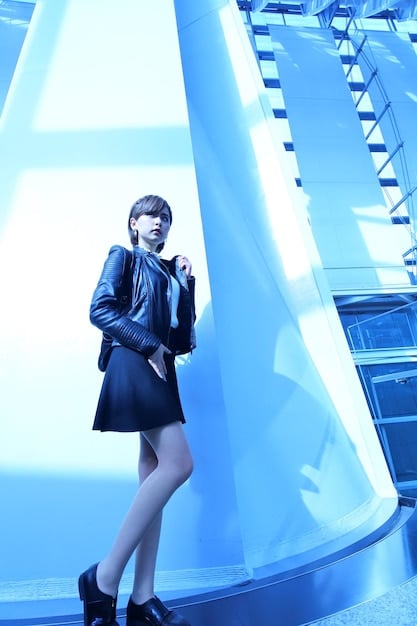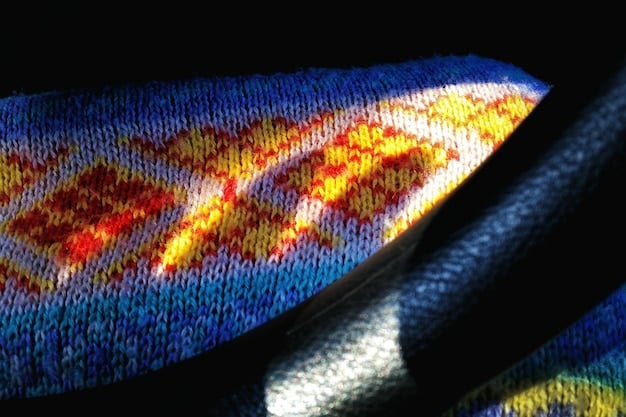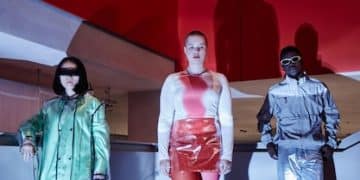AI in US Fashion: Transforming the Runway Experience

Advertisements
AI is revolutionizing the US fashion industry, reshaping runway experiences through personalized designs, enhanced logistics, and immersive consumer interactions.
The intersection of US Fashion and Technology: How AI is Transforming the Runway Experience is becoming increasingly evident, as artificial intelligence begins to permeate design, logistics, and consumer engagement. From personalized garment creation to predictive trend analysis, AI is poised to revolutionize the way fashion is conceived, produced, and experienced in the United States.
Advertisements
The Dawn of AI-Driven Design in US Fashion
Artificial intelligence is no longer a futuristic concept but a tangible tool influencing the creative processes of designers in the US fashion industry. From inception to execution, AI algorithms are enhancing traditional design methods.
AI as a Creative Partner
AI’s ability to analyze vast datasets and identify emerging trends is making it an invaluable creative partner for designers. This collaboration allows for the exploration of new aesthetics and innovative design approaches.
Personalized Fashion with AI
One of the most exciting applications of AI in fashion is its capacity for personalization. Brands can now offer customized designs tailored to individual preferences, ensuring a truly unique and satisfying customer experience.
Advertisements
- Tailored Designs: AI algorithms analyze customer data to create personalized garment designs.
- On-Demand Manufacturing: AI facilitates efficient on-demand manufacturing, reducing waste and improving responsiveness to customer needs.
- Virtual Try-Ons: AI-powered virtual try-on tools enhance the online shopping experience, increasing customer confidence and reducing returns.

AI is fundamentally changing how garments are designed and customized, leading to more efficient and personalized fashion experiences. This technological integration is also redefining the relationship between designers and consumers.
Enhancing the Runway Experience with AI
Runway shows are traditionally a platform for showcasing new collections and setting trends. AI is transforming these events by augmenting the experience with interactive elements, real-time personalization, and data-driven insights.
Interactive Runway Elements
AI can enable interactive runway elements, such as real-time feedback displays, personalized model styling based on audience preferences, and virtual reality integrations that allow spectators to explore designs in an immersive environment.
Real-Time Personalization
By analyzing audience data, AI can personalize the runway experience in real-time. This includes adjusting lighting, music, and even garment designs to reflect the preferences of the attendees, creating a unique and memorable event.
- Data-Driven Insights: AI provides real-time data on audience reactions, helping designers understand which designs resonate most.
- Augmented Reality Overlays: AR overlays can enhance the runway show with digital animations and interactive elements.
- Personalized Model Styling: AI can adjust model styling in real-time based on audience feedback, creating a dynamic and engaging experience.
The integration of AI is making runway shows more engaging, immersive, and personalized, enhancing the overall experience for both attendees and designers.
AI’s Role in Sustainable Fashion Practices in the US
Sustainability is a growing concern in the fashion industry. AI offers solutions for reducing waste, optimizing resource use, and promoting ethical manufacturing practices within the US.
Predictive Trend Analysis
AI algorithms can analyze historical data and predict future trends, helping designers avoid overproduction and reduce waste by accurately forecasting demand.
Optimizing Resource Use
AI can optimize resource use by analyzing supply chain data and identifying inefficiencies. This includes reducing energy consumption, minimizing water usage, and optimizing transportation routes.

- Waste Reduction: AI algorithms optimize material usage and reduce fabric waste in the design and manufacturing processes.
- Supply Chain Optimization: AI enhances transparency and efficiency in the supply chain, promoting ethical and sustainable sourcing.
- Circular Economy Models: AI facilitates circular economy models by optimizing recycling processes and promoting the reuse of materials.
AI is playing a crucial role in promoting sustainable practices within the US fashion industry, helping to reduce waste, optimize resource use, and create a more ethical and environmentally friendly sector.
The Impact of AI on Fashion Retail in the US Market
AI is transforming the retail landscape of the US fashion market by enhancing customer experiences, streamlining operations, and optimizing inventory management.
Enhanced Customer Experiences
AI-powered chatbots and virtual assistants provide personalized customer service, enhancing the shopping experience and improving customer satisfaction. These tools offer instant support, product recommendations, and styling advice.
Streamlined Operations
AI streamlines operations by automating repetitive tasks, such as order processing and inventory management, increasing efficiency and reducing costs for retailers.
AI-Driven Analytics
AI provides valuable insights into customer behavior and market trends. Retailers can leverage this information to optimize pricing strategies, personalize marketing campaigns, and improve inventory planning.
By enhancing customer experiences, streamlining operations, and optimizing inventory management, AI is significantly impacting the fashion retail landscape in the US market.
Ethical Considerations in AI-Driven Fashion in the US
The increasing use of AI in the US fashion industry raises important ethical considerations, including data privacy, algorithmic bias, and the potential displacement of human workers.
Data Privacy Concerns
The collection and use of customer data by AI algorithms raise concerns about data privacy. Ensuring transparency and implementing robust data protection measures is crucial to maintaining consumer trust.
Algorithmic Bias
AI algorithms can perpetuate existing biases if they are trained on biased data. Addressing algorithmic bias and promoting fairness in AI-driven fashion is essential to ensure equitable outcomes.
Workforce Displacement
The automation of tasks through AI may lead to the displacement of human workers in the fashion industry. Addressing this challenge through retraining programs and job creation initiatives is vital to mitigate the negative impact.
Addressing these ethical considerations is crucial to ensure that AI is used responsibly and ethically in the US fashion industry, promoting fairness, transparency, and inclusivity.
Future Trends: AI and the Evolving Fashion Landscape in the US
Looking ahead, the integration of AI in the US fashion industry is expected to continue, with further advancements in personalized fashion, sustainable practices, and immersive consumer experiences.
Advanced Personalization
Future AI applications will enable even more advanced personalization, including real-time customization of garments based on individual preferences and environmental conditions. This will lead to a new era of personalized fashion experiences.
Increased Sustainability
AI will play an increasingly important role in promoting sustainability by optimizing material usage, reducing waste, and enhancing supply chain transparency. This will contribute to a more environmentally friendly and ethical fashion industry.
Immersive Consumer Experiences
AI-powered virtual and augmented reality technologies will create immersive consumer experiences, allowing shoppers to try on clothes virtually, explore new designs in 3D environments, and interact with brands in novel ways. This will enhance engagement and satisfaction.
The future of the US fashion industry will be shaped by continued advancements in AI, leading to more personalized, sustainable, and immersive experiences for both designers and consumers.
| Key Aspect | Brief Description |
|---|---|
| 🎨 AI-Driven Design | AI enhances design processes through data analysis and personalized garment creation. |
| 🛍️ Retail Transformation | AI enhances customer experiences and streamlines operations in fashion retail. |
| 🌿 Sustainable Practices | AI optimizes resource use and promotes sustainability in fashion manufacturing. |
| 🚀 Runway Enhancements | AI augments runway shows with interactive elements and real-time personalization. |
Frequently Asked Questions
▼
AI is aiding designers by analyzing trends, generating designs, and personalizing clothing. This not only speeds up the creative process but also opens doors to innovative styles previously unexplored.
▼
AI enhances waste reduction, optimizes resource allocation, and boosts supply chain transparency. This results in more eco-conscious manufacturing practices, supporting the industry’s sustainability goals.
▼
AI enhances customization by predicting consumer preferences, streamlining the shopping experience through virtual assistants, and creating personalized offers that cater to individual tastes and needs.
▼
Ethical concerns include data privacy, algorithm biases, and job losses. The industry needs to ensure transparency, fairness, and worker support to mitigate these potential issues.
▼
While technology advances with virtual shows, physical runway events remain crucial for brand building and industry networking, so a complete replacement is improbable. A hybrid model will be the trend.
Conclusion
The integration of AI into the US Fashion and Technology: How AI is Transforming the Runway Experience is revolutionizing the industry, providing opportunities for greater personalization, sustainability, and immersive consumer experiences. As AI continues to evolve, the fashion landscape will undoubtedly transform, reshaping the way designs are conceived, produced, and experienced in the United States. The key lies in harnessing AI’s power ethically and responsibly, fostering innovation while ensuring inclusivity and sustainability.





